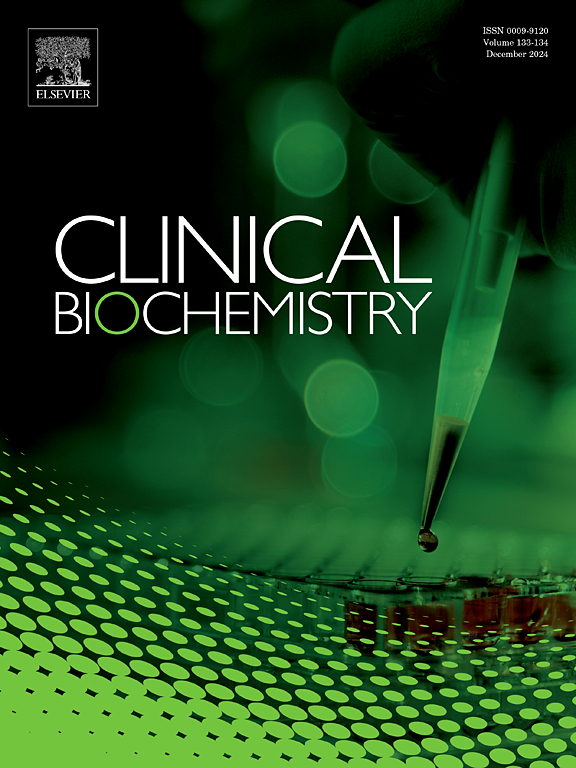血浆三甲胺水平预测心脏骤停幸存者的不良心血管事件:一项前瞻性队列研究
IF 2.1
3区 医学
Q2 MEDICAL LABORATORY TECHNOLOGY
引用次数: 0
摘要
背景:三甲胺n -氧化物(TMAO)途径与多种心血管疾病有关,但其对心脏骤停(SCA)幸存者的预后价值尚不清楚。方法前瞻性纳入SCA存活并接受植入式心律转复除颤器(ICDs)的患者。我们评估了血浆tmao相关代谢物浓度与长期不良临床事件(包括复发性致死性室性心律失常(VA))之间的关系。结果共纳入75例SCA幸存者。在中位随访1099天期间,34例(45.3%)患者出现不良临床事件,包括24例(32.2%)危及生命的VA, 12例(16.0%)心力衰竭再住院,5例(6.7%)心血管死亡。三甲胺(TMA)、肉碱、胆碱和肌酐与左室射血分数(LVEF)、纽约心脏协会功能分级和n端前脑利钠肽(NT-proBNP)等临床重要参数有很强的相关性。这四种代谢物与临床不良事件呈正相关,在调整年龄、性别、LVEF、肾功能和NT-proBNP水平后,较高的TMA中位水平与三倍以上的风险增加相关(风险比= 3.36,95%可信区间[CI]: 1.18-9.59;p = 0.024)。结合LVEF、TMA和TMA相关代谢物(胆碱、肉碱、肌酐)加权和的评分系统VT-C3显示出对不良事件(曲线下面积[AUC]: 0.75, 95% CI: 0.64-0.85)和复发性致死性VA (AUC: 0.73, 95% CI: 0.62-0.84)的显著预测能力。没有观察到TMAO和甜菜碱的显著预后价值。结论:研究结果表明,血浆TMA、胆碱、肉碱和肌酐浓度与SCA幸存者随后不良临床事件的风险增加有关。一个包含LVEF和这些生物标志物的简单评分系统可以增强当前的风险分层,并改善基于ICD植入的二级预防策略。本文章由计算机程序翻译,如有差异,请以英文原文为准。

Plasma trimethylamine levels predict adverse cardiovascular events in sudden cardiac arrest Survivors: A prospective cohort study
Background
The trimethylamine N-oxide (TMAO) pathway has been associated with multiple cardiovascular diseases, yet its prognostic value for sudden cardiac arrest (SCA) survivors remains unknown.
Methods
Patients who survived SCA and received implantable cardioverter defibrillators (ICDs) were prospectively enrolled. We evaluated the associations between plasma concentrations of TMAO-related metabolites and long-term adverse clinical events, including recurrent lethal ventricular arrhythmia (VA).
Results
A total of 75 SCA survivors were included in the study. During a median follow-up of 1099 days, 34 (45.3 %) patients experienced adverse clinical events, including 24 (32.2 %) with life-threatening VA, 12 (16.0 %) with heart failure rehospitalization, and 5 (6.7 %) with cardiovascular death. Trimethylamine (TMA), carnitine, choline, and creatinine showed strong correlations with clinically significant parameters such as left ventricular ejection fraction (LVEF), New York Heart Association functional class, and N-terminal pro-brain natriuretic peptide (NT-proBNP). These four metabolites demonstrated positive associations with adverse clinical events, with higher median level of TMA associated with more than a threefold increased risk after adjusting for age, sex, LVEF, kidney function, and NT-proBNP levels (hazard ratio = 3.36, 95 % confidence interval [CI]: 1.18–9.59; P = 0.024). A scoring system, VT-C3, incorporating LVEF, TMA, and the weighted sum of TMA-related metabolites (Choline, Carnitine, Creatinine), showed significant predictive capacity for both adverse events (area under the curve [AUC]: 0.75, 95 % CI: 0.64–0.85) and recurrent lethal VA (AUC: 0.73, 95 % CI: 0.62–0.84). No significant prognostic values were observed for TMAO and betaine.
Conclusions
Our findings suggest that plasma concentrations of TMA, choline, carnitine, and creatinine are associated with an increased risk of subsequent adverse clinical events among SCA survivors. A simple scoring system comprising LVEF and these biomarkers could enhance current risk stratification and improve secondary prevention strategies based on ICD implantation.
求助全文
通过发布文献求助,成功后即可免费获取论文全文。
去求助
来源期刊

Clinical biochemistry
医学-医学实验技术
CiteScore
5.10
自引率
0.00%
发文量
151
审稿时长
25 days
期刊介绍:
Clinical Biochemistry publishes articles relating to clinical chemistry, molecular biology and genetics, therapeutic drug monitoring and toxicology, laboratory immunology and laboratory medicine in general, with the focus on analytical and clinical investigation of laboratory tests in humans used for diagnosis, prognosis, treatment and therapy, and monitoring of disease.
 求助内容:
求助内容: 应助结果提醒方式:
应助结果提醒方式:


